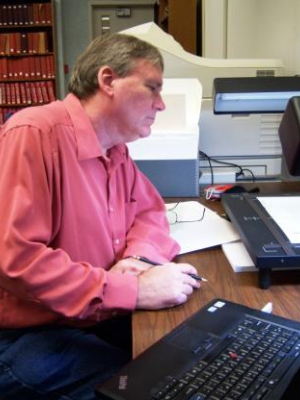It’s the ironies.
That, says Phil Mirowski, is what makes a figure like Paul Samuelson so fascinating. Since arriving at Duke in January, Phil, a 2011–12 Senior Research Fellow of the Center for the History of Political Economy, has been happily browsing through the Samuelson papers in the Economists’ Papers Project—and making all sorts of unexpected discoveries.
“What really comes through about Samuelson from the archives is his interest in history. The guy read as much history as anybody—the big names, sure, but even the obscure figures didn’t escape his attention. And he was doing that from the very beginning. Even as a youngster, he was borrowing books by Launhardt from Jacob Viner. But—and here’s where the irony comes in—he didn’t believe that history was important to economics.”
As Phil explains, having access to the unpublished writings of a particular economist gives one a better sense of what he (or she) was really like. Samuelson, for example, in his published utterances, advised economists to avoid writing about methodology. “But in the papers, he talks about methodology all the time. Again, a paradox, and one that doesn’t come through by reading just his published work.”
In singling out a figure such as Samuelson in this way, Phil recognizes that he is displaying a paradox of his own. After all, his approach to history is not to focus on the intentions of individual economists but to take, as he puts it, a more “macro” approach. To Phil, history is about the conditions and contexts that allow an idea to emerge and, more important, to gain currency and tenure. “What I’m interested in are the situations in which an idea takes off and is reproduced and adopted by different groups.”
Indeed, one of the projects Phil is working on during his tenure at the Center examines just that. Together with Avner Offer and Gabriel Soderberg he is trying to understand why strident opposition to a Nobel Prize in economics was overcome by the Bank of Sweden. “What set of circumstances led the Swedish Bank in the 1960s to decide that economics deserved a Nobel Prize? Was it simply due to the agency of individuals such as Per Asbrink, as a traditional approach would have it? Or was Asbrink instead caught up in movements and agendas that were really behind the decision?”
It has not been just the archives that have made for a rewarding and productive fellowship at the Center. Phil’s visit here has coincided with that of his colleague Eddie Nik-Khah. The two are working together on a project examining the response of the economics profession to the current economic crisis. They will present the paper at the 2012 HOPE conference, which will explore the economist as public intellectual. “It’s made all the difference in the world for the two of us to be able to work literally under the same roof—in the same room even,” says Phil, who is Carl Koch Professor of Economics and the History and Philosophy of Science at University of Notre Dame.
Also fruitful has been the opportunity to meet scholars such as Rob Mitchell and Barbara Herrnstein Smith who, like Phil, have a longstanding interest in science studies. As Phil observes, science studies can sometimes be found in unlikely places: Mitchell is in English, and Smith is in literature. “There is a lot of that here at Duke, cross-disciplinary activity, and it’s been fun to be around people who share the kind of cross-disciplinary interests that are similar to mine,” Phil says.
Usually, when a scholar visits an archive, he has only a few days or a week at his disposal and so feels pressured to spend every waking moment in the library. But having an entire spring completely changes things. “It’s been a luxury to drift over to the library when the mood strikes me and open up another box of materials,” Phil says. “I’m thankful to the Center for making that possible.”
In addition to the projects on the Nobel Prize and the response of economists to the crisis, Phil is also working on his presidential address to the HES for this summer’s meeting.
Will the Samuelson papers figure into the address? “Perhaps,” Phil says, smiling. “Perhaps.”
--Paul Dudenhefer
